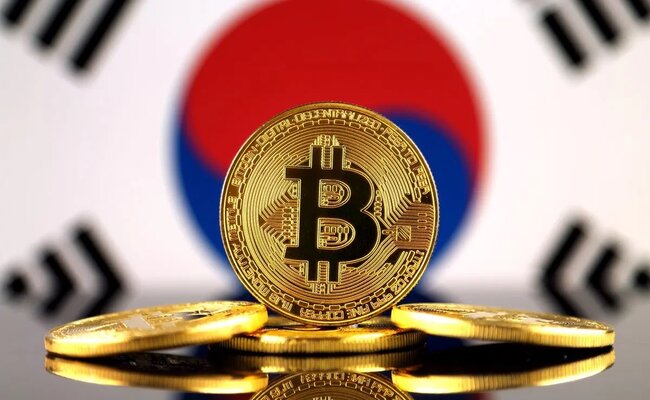Highlights:
- South Korea will apply stricter KYC rules as it begins to allow some institutional crypto trading in June.
- Crypto policy takes center stage in South Korea’s 2025 election, with candidates backing ETFs and stablecoins.
- The Digital Asset Basic Act will guide crypto use in South Korea with clear rules for trading and stablecoins.
South Korea will begin applying tighter know-your-customer checks for institutional crypto clients in June. This move comes as the country starts allowing some institutional activity in the crypto space. Local banks and crypto exchanges must now examine each client’s transaction purpose and the source of funds more closely. The Financial Services Commission said the goal is to prevent risks linked to money laundering.
The South Korean Financial Services Commission (FSC) announced that starting from June 2025, non-profit organizations will be allowed to sell cryptocurrency obtained through donations, and exchanges can liquidate user fees paid in crypto assets. The FSC requires exchanges and…
— Wu Blockchain (@WuBlockchain) May 21, 2025
In line with these changes, certain non-profit groups will have permission to sell digital assets received as donations. Exchanges will also be allowed to convert crypto used to pay trading fees into local currency. These steps indicate a cautious return of institutional involvement in crypto. Meanwhile, institutions and their top executives will face monitoring to detect possible illegal financial activities.
The Korea Federation of Banks and the Digital Asset Exchange Association will issue further guidelines before June. These instructions will ensure exchanges and banks follow the new KYC measures correctly. The changes form part of South Korea’s efforts to make the crypto sector more secure. Officials said these rules will support the country’s financial system while reopening the market gradually.
The government plans to open the door further for institutional investors by the end of 2025. Crypto exchanges will only allow public companies and certified professional investors to trade under certain rules. These upcoming changes will also focus on adding more security for transaction monitoring. All of these measures prove a change in the country’s strategy for managing digital assets.
Political Support for Crypto ETFs Shapes Presidential Campaign Trail
Crypto policy is now a major focus for the main political contenders as South Korea prepares to vote in 2025. One of the top contenders, Lee Jae-myung, has suggested introducing a stablecoin linked to the Korean Won to the market. He feels this virtual currency could help the country become less dependent on foreign money like the U.S. dollar. He is emphasizing the increasing role digital assets play in the country’s economy in his campaign.
South Korean presidential front-runner proposes won-based stablecoin
South Korea’s Democratic Party leader Lee Jae-myung proposed creating a stablecoin tied to the Korean won to prevent capital outflows and strengthen national financial sovereignty.
Speaking during a recent… pic.twitter.com/CJHbxXLZ4R
— MetaEra (@MetaEraHK) May 20, 2025
At the same time, candidate Kim Moon-soo has hinted that he is in favor of considering spot Bitcoin exchange-traded funds. He believes these tools can update and improve the country’s financial markets. This confirms a broader movement of politicians calling for more open crypto use. Several campaigns now focus on attracting young and tech-savvy voters.
BREAKING: 🇰🇷 KOREA’S FIRST #BITCOIN PRESIDENT?
Kim Moon-soo—pro-Bitcoin powerhouse—has just been named the official Presidential Candidate for Korea’s Conservative Party!
He vows to end the ETF ban & invest government reserves in BTC.
Asia’s first Bitcoin President is… pic.twitter.com/1vygZDCtLI
— Asaf Givoli (@AsafGivoli) May 3, 2025
Many observers believe these views reflect internal goals rather than outside influence. Although the U.S. has recently approved crypto-related products, South Korean leaders appear to be setting their own direction. These campaign promises show how much public interest in crypto has grown.
South Korea Crypto Regulations Set to Expand Under Proposed Digital Asset Act
South Korea plans to introduce the Digital Asset Basic Act to build a structured legal system for digital assets. The law will focus on stablecoins, trading in cryptocurrencies, and protecting investors. The government is working to provide guidance on how digital assets function in the nation.
Lee Keun-ju, who heads the Korea Fintech Industry Association, backed these plans during a recent discussion. He pointed out that having a Bitcoin ETF could tie crypto closer to the capital markets. He also recommended establishing a market for stablecoins backed by Won to stop money from leaving the country.
Best Crypto Exchange
- Over 90 top cryptos to trade
- Regulated by top-tier entities
- User-friendly trading app
- 30+ million users
eToro is a multi-asset investment platform. The value of your investments may go up or down. Your capital is at risk. Don’t invest unless you’re prepared to lose all the money you invest. This is a high-risk investment, and you should not expect to be protected if something goes wrong.






